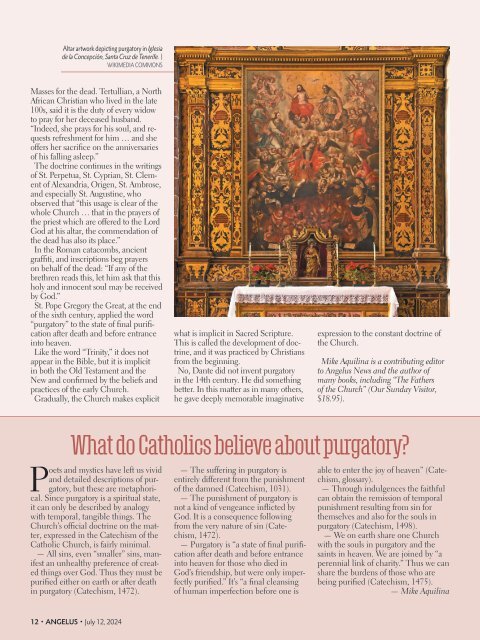Angelus News | July 12, 2024 | Vol. 9 No. 14
On the cover: A PBS series recently suggested purgatory was the “invention” of 14th-century Italian poet Dante Alighieri. Could it be true? Does such a place — somewhere between heaven and hell — really exist? On Page 10, contributing editor Mike Aquilina details purgatory’s biblical roots in the Old and New Testaments, all of which point to the hope and forgiveness God promises “in the age to come” to believers.
On the cover: A PBS series recently suggested purgatory was the “invention” of 14th-century Italian poet Dante Alighieri. Could it be true? Does such a place — somewhere between heaven and hell — really exist? On Page 10, contributing editor Mike Aquilina details purgatory’s biblical roots in the Old and New Testaments, all of which point to the hope and forgiveness God promises “in the age to come” to believers.
Create successful ePaper yourself
Turn your PDF publications into a flip-book with our unique Google optimized e-Paper software.
Altar artwork depicting purgatory in Iglesia<br />
de la Concepción, Santa Cruz de Tenerife. |<br />
WIKIMEDIA COMMONS<br />
Masses for the dead. Tertullian, a <strong>No</strong>rth<br />
African Christian who lived in the late<br />
100s, said it is the duty of every widow<br />
to pray for her deceased husband.<br />
“Indeed, she prays for his soul, and requests<br />
refreshment for him … and she<br />
offers her sacrifice on the anniversaries<br />
of his falling asleep.”<br />
The doctrine continues in the writings<br />
of St. Perpetua, St. Cyprian, St. Clement<br />
of Alexandria, Origen, St. Ambrose,<br />
and especially St. Augustine, who<br />
observed that “this usage is clear of the<br />
whole Church … that in the prayers of<br />
the priest which are offered to the Lord<br />
God at his altar, the commendation of<br />
the dead has also its place.”<br />
In the Roman catacombs, ancient<br />
graffiti, and inscriptions beg prayers<br />
on behalf of the dead: “If any of the<br />
brethren reads this, let him ask that this<br />
holy and innocent soul may be received<br />
by God.”<br />
St. Pope Gregory the Great, at the end<br />
of the sixth century, applied the word<br />
“purgatory” to the state of final purification<br />
after death and before entrance<br />
into heaven.<br />
Like the word “Trinity,” it does not<br />
appear in the Bible, but it is implicit<br />
in both the Old Testament and the<br />
New and confirmed by the beliefs and<br />
practices of the early Church.<br />
Gradually, the Church makes explicit<br />
what is implicit in Sacred Scripture.<br />
This is called the development of doctrine,<br />
and it was practiced by Christians<br />
from the beginning.<br />
<strong>No</strong>, Dante did not invent purgatory<br />
in the <strong>14</strong>th century. He did something<br />
better. In this matter as in many others,<br />
he gave deeply memorable imaginative<br />
expression to the constant doctrine of<br />
the Church.<br />
Mike Aquilina is a contributing editor<br />
to <strong>Angelus</strong> <strong>News</strong> and the author of<br />
many books, including “The Fathers<br />
of the Church” (Our Sunday Visitor,<br />
$18.95).<br />
What do Catholics believe about purgatory?<br />
Poets and mystics have left us vivid<br />
and detailed descriptions of purgatory,<br />
but these are metaphorical.<br />
Since purgatory is a spiritual state,<br />
it can only be described by analogy<br />
with temporal, tangible things. The<br />
Church’s official doctrine on the matter,<br />
expressed in the Catechism of the<br />
Catholic Church, is fairly minimal.<br />
— All sins, even “smaller” sins, manifest<br />
an unhealthy preference of created<br />
things over God. Thus they must be<br />
purified either on earth or after death<br />
in purgatory (Catechism, <strong>14</strong>72).<br />
— The suffering in purgatory is<br />
entirely different from the punishment<br />
of the damned (Catechism, 1031).<br />
— The punishment of purgatory is<br />
not a kind of vengeance inflicted by<br />
God. It is a consequence following<br />
from the very nature of sin (Catechism,<br />
<strong>14</strong>72).<br />
— Purgatory is “a state of final purification<br />
after death and before entrance<br />
into heaven for those who died in<br />
God’s friendship, but were only imperfectly<br />
purified.” It’s “a final cleansing<br />
of human imperfection before one is<br />
able to enter the joy of heaven” (Catechism,<br />
glossary).<br />
— Through indulgences the faithful<br />
can obtain the remission of temporal<br />
punishment resulting from sin for<br />
themselves and also for the souls in<br />
purgatory (Catechism, <strong>14</strong>98).<br />
— We on earth share one Church<br />
with the souls in purgatory and the<br />
saints in heaven. We are joined by “a<br />
perennial link of charity.” Thus we can<br />
share the burdens of those who are<br />
being purified (Catechism, <strong>14</strong>75).<br />
— Mike Aquilina<br />
<strong>12</strong> • ANGELUS • <strong>July</strong> <strong>12</strong>, <strong>2024</strong>

















